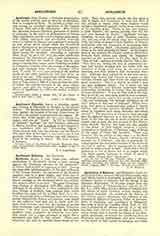

Apollinaris (THE ELDER), a Christian grammarian of the fourth century, first at Berytus in Phoenicia, then at Laodicea in Syria. He became a priest, and was among the stanchest upholders of the Council of Nica (325) and of St. Athanasius. When Julian the Apostate forbade Christian professors to lecture or comment on the poets or philosophers of Greece (362), Apollinaris and his son bearing the same name, both highly cultivated and resourceful, zealously strove to replace the literary masterpieces of antiquity by new works which should offset the threatened loss to Christians of the advantages of polite instruction and help to win respect for the Christian religion among the heathens. According to Socrates (Hist. Eccl., II, xlvi; III, xvi), the elder Apollinaris translated the Pentateuch into Greek hexameters, converted the first two books of Kings into an epic poem of twenty-four cantos, wrote tragedies modeled on Euripides, comedies after the manner of Menander, and odes imitated from Pindar. Sozomen (Hist. Eccl., V, xviii; VI, xxv) says nothing of the poetical works of the elder Apollinaris, but lays stress on those of his son. This improvised Greek literature, however, uninspired by genius, did not survive. As soon as Valentinian I (364-375) had revoked the edict of Julian the schools returned to the great classic writers, and only the memory of the courageous efforts of Apollinaris to nullify the malice of Julian survived.
JOHN J. A’ BECKET

